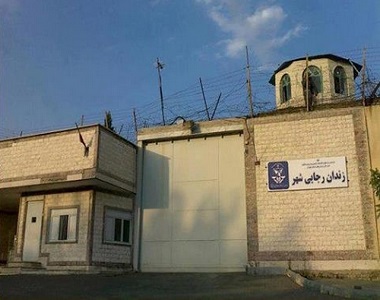Amnesty International: URGENT ACTION EVIN PRISONERS AT RISK AFTER REPORT OF RIOT Reports of prison guards raiding Section 350 of Tehran’s Evin Prison, where many political prisoners are held, have emerged raising fears about the safety of prisoners. The unrest appears to have resulted in prisoners sustaining injuries, including broken ribs. It has been reported that at least 32 individuals from Section 350 have been transferred to solitary confinement in Section 240 of the prison. Continue reading “Iran: Evin prisoners at risk after report of riot”
Archives: Articles
Trade unionist punished for hunger strike: Shahrokh Zamani
URGENT ACTION
TRADE UNIONIST PUNISHED FOR hunger strike
Iranian trade unionist Shahrokh Zamani, a prisoner of conscience, has ended a hunger strike after 38 days, which has left him in poor health. He is facing reprisals for demanding prisoners’ rights inside Raja’i Shahr Prison. Continue reading “Trade unionist punished for hunger strike: Shahrokh Zamani”
Heshmatollah Tabarzadi’s Iranian New Year Message
HRANA News Agency – Heshmatollah Tabarzadi, a journalist and political prisoner in Rajai Shahr prison lounge 12, wrote to the Iranian New Year “Iranians are facing imprisonment and torture, convicted of expression of opinion and taking legal actions. The regime has stripped away Iranians’ right of self-determination and violated the Universal Declaration of Human Rights. Detention centers and prisons are filled with honorable Justice lawyers, teachers, human rights activists, religious minorities and religious identity activists, women activists, students, workers, artists, journalists, political activists and others seeking freedom and equality. ”
The following is the full text of Heshmatollah Tabarzadi’s New Year message: Continue reading “Heshmatollah Tabarzadi’s Iranian New Year Message”
Letter exposing fabricated charges against four Sunni prisoners
HRANA News Agency – Iranian state-run media has broadcast a number of documentaries about Sunni prisoners in recent weeks, many featuring clips of Sunni prisoners who had been tortured apparently testifying against themselves and other prisoners.
Following the most recent documentary, broadcast on 14 March 2014, about four Sunni prisoners who have been sentenced to death, a letter from their representative provides evidence exposing the fabricated charges against them. Continue reading “Letter exposing fabricated charges against four Sunni prisoners”
Rajai Shahr Prison: Even death whimpers here!
HRANA News Agency – The imprisoned worker activist, Shahrokh Zamani, has been witnessing the execution of 7 prisoners in the solitary confinements of Rajai Shahr Prison.
He has written what he has witnessed in a letter which is published by the “Committee to Defend Shahrokh Zamani”: Continue reading “Rajai Shahr Prison: Even death whimpers here!”
We shall honor March, 8th, the International Women’s Day
HRANA News Agency – Heshmatollah Tabarzadi, a political prisoner in Rajai Shahr prison lounge 12, writes in a letter: “No to death penalty, release of all political prisoners, minimum wage and no to mandatory veiling should be the national and minimum level of our demands at the moment. This is an effective, initial step that can be common consensus and objective for the movement.”
The following is the full text of the article submitted to HRANA news agency: Continue reading “We shall honor March, 8th, the International Women’s Day”
Letter from Sunni prisoner in response to ‘confessions’ documentary
HRANA News Agency – The official Iranian television showed an interview with Kaveh Sharifi, the Sunni prisoner, some time ago.
Kaveh Sharifi has written a letter explaining about this confession. Continue reading “Letter from Sunni prisoner in response to ‘confessions’ documentary”
Iranian Political Prisoner’s statement on the Occasion of 11 February
HRANA News Agency – In a statement, 10 political prisoners of the Ward #10 of Rajai-Shahr prison suggested: “No to Death Penalty and requesting abolition of execution could be a common goal and unifying political slogan for all democratic forces in Iran.”
The following is the full text of the statement: Continue reading “Iranian Political Prisoner’s statement on the Occasion of 11 February”
4 Sunni Prisoners’ statement about the so-called “the Week of Unity”
HRANA News Agency – Four Sunni-Kurdish prisoners of Ghezel-Hesar prison – Hamed Ahmadi, Kamal Molayi, Jamshid Dehghani, and Jahangir Dehghani – who have been on hunger strike since November, 4th , 2013 issued an statement with respect to the so-called “the week of Unity” and submitted a copy to HRANA.
In this statement, the prisoners declared “we draw Iranian intellectuals’ attention to ourselves and to the young Sunni prisoners in the prisons of Kurdistan, West Azerbaijan, Sistan and Baluchistan, Gorgan, Ahwaz, Bandar Abbas, Kermanshah, Rajayee-Shahr, Evin and Ghezelhesar. We are examples of “unity” in Iran”.
The full-text of the statement is as follows: Continue reading “4 Sunni Prisoners’ statement about the so-called “the Week of Unity””
We have not been involved in any armed action
HRANA News Agency – Four Sunni-Kurdish prisoners of Ghezel-Hesar prison – Hamed Ahmadi, Kamal Molayi, Jamshid Dehghani, and Jahangir Dehghani – who have been on hunger strike since November, 4th , 2013 issued a letter, stating “We are protesting because our belief and faith has been insulted. However, we have never been involved in any armed action. Now, we are sentenced to death with the charge of acting against national security and facing risk of execution, which may happen anytime.” Continue reading “We have not been involved in any armed action”












